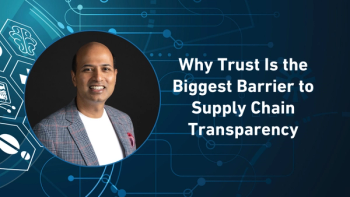
Driving Supply Chain Resilience
In the final part of his Pharma Commerce video interview, Scott Tillman, Logility’s senior vice president of innovation, discusses how uncertainty can help reshape the way organizations prioritize supply chain investments.
In a video interview with Pharma Commerce, Scott Tillman, Logility’s senior vice president of innovation, addresses the gap between high interest in generative AI (GenAI) and its relatively low adoption in supply chain-specific applications, as highlighted in Logility’s Supply Chain Horizons 2025 Market Report. He identified several key reasons for this disconnect.
First, many companies experience “paralysis by analysis” due to the rapidly evolving technology landscape. With so many options and an unclear starting point, organizations often hesitate to act. Tillman emphasized the importance of adopting an agile, iterative approach—developing, deploying, learning, and refining continuously—rather than seeking a perfect solution from the outset.
Second, he pointed out a cultural shift that needs to happen within organizations. Companies must become more comfortable with experimentation in software implementation, viewing it as a learning process rather than a one-time deployment. This mindset change is essential for successfully leveraging emerging technologies like GenAI.
Financial and technical barriers also play a role. Expertise in GenAI is both scarce and costly, and training models can be time-consuming. Organizations face a strategic decision: whether to build their own AI models or depend on third-party software vendors. Tillman noted that this debate is still in its early stages, and its outcome will shape how companies integrate GenAI into their operations.
Finally, he stressed that in the supply chain space, companies will increasingly depend on vendors like Logility to provide specialized expertise and value-driven use cases. These could include demand sensing, forecasting insights, and other prescriptive applications of GenAI tailored to business needs. Overall, Tillman advocated for a practical, phased approach to GenAI adoption, focusing on clear, impactful use cases rather than waiting for the perfect solution.
He also comments on some common misconceptions supply chain leaders might have about what it means to be “digitally optimized;” the role of automation and GenAI evolving in workforce development; how geopolitical or economic volatility can potentially reshape the way organizations prioritize supply chain investments; and much more.
A transcript of his conversation with PC can be found below.
PC: Looking ahead to the rest of 2025 and 2026, how do you see geopolitical or economic volatility reshaping the way organizations prioritize supply chain investments—especially in tech and talent?
Tillman: I think there's a focus on supply chain resilience and technology that enables that resilience, because there's a lot of uncertainty out there, and nobody knows where the next potential uncertainty is going to occur. Trying to plan around specific types of uncertainty is difficult. I think companies are looking to invest in technologies that drive resilience, so that they can have a pocket of understanding that regardless of where that uncertainty comes from—whether it be tariffs, political, COVID, some sort of pandemic-type thing that impacts the supply chain. They're focused on resilience.
One of the things we're seeing is a lot of investment in technologies that deal with your network. How does your network respond? How is your network flexible? How do you assess the risk in your network? I think managing supply chains in terms of risk is something that you're going to see moving forward more so than what has been in the past. There's always been an element of scenarios, and trying to plan around scenarios—but thinking about it more from a financial risk standpoint—and then using that risk assessment to look and prioritize how you might build that resiliency into your supply chain is going to be more of a focus as we move forward. I think companies are not looking at specific types of risk. They're measuring how we make our supply chains more resilient to handle any type of risk that might come forward.
Newsletter
Stay ahead in the life sciences industry with Pharmaceutical Commerce, the latest news, trends, and strategies in drug distribution, commercialization, and market access.




